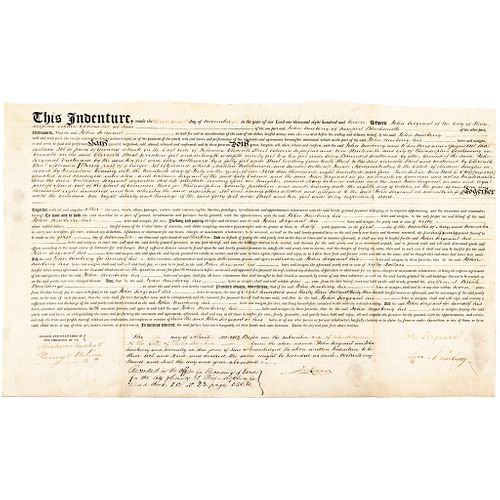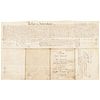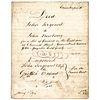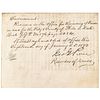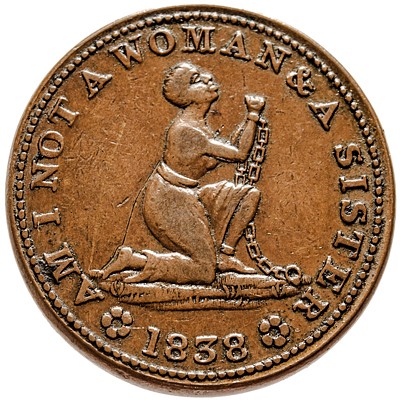1812 JOHN SARGENT VP Candidate + JOHN GEYER Phila. Mayor Signed Vellum Land Deed
Lot 200
Categories
Estimate:
$300 - $400
Absentee vs Live bid
Two ways to bid:
- Leave a max absentee bid and the platform will bid on your behalf up to your maximum bid during the live auction.
- Bid live during the auction and your bids will be submitted real-time to the auctioneer.
Bid Increments
| Price | Bid Increment |
|---|---|
| $0 | $10 |
| $200 | $20 |
| $300 | $25 |
| $500 | $50 |
| $1,000 | $100 |
| $2,000 | $200 |
| $3,000 | $250 |
| $5,000 | $500 |
| $10,000 | $1,000 |
| $20,000 | $2,000 |
| $30,000 | $2,500 |
| $50,000 | $5,000 |
| $100,000 | $10,000 |
| $200,000 | $20,000 |
| $300,000 | $25,000 |
| $500,000 | $50,000 |
About Auction
By Early American History Auctions
Feb 27, 2021
Set Reminder
2021-02-27 12:00:00
2021-02-27 12:00:00
America/New_York
Bidsquare
Bidsquare : Black History & Slavery, Historic Autographs, Colonial America & Weapons
https://www.bidsquare.com/auctions/early-american-history-auctions/black-history-slavery-historic-autographs-colonial-america-weapons-6434
318 Lots of Rare, Historic Autographs, Americana, Civil War Era, George Washington, Abraham Lincoln, Slavery & Black History, Revolutionary War Era, Colonial America, Federal Period, War of 1812, Colonial Currency, Historic Early American Guns & more... Early American History Auctions auctions@earlyamerican.com
318 Lots of Rare, Historic Autographs, Americana, Civil War Era, George Washington, Abraham Lincoln, Slavery & Black History, Revolutionary War Era, Colonial America, Federal Period, War of 1812, Colonial Currency, Historic Early American Guns & more... Early American History Auctions auctions@earlyamerican.com
- Lot Description
Autographs
1813 "John Sergeant" Historic 1832 Republican Party Vice Presidential Candidate with Henry Clay, together with Philadelphia Mayor John Geyer, Signed Vellum Land Deed
JOHN SARGENT (1779-1852). Represented Pennsylvania in the U.S. House of Representatives, the National Republican Party's 1832 Presidential Election Campaign Vice Presidential nominee on their Ticket together with Senator Henry Clay.
JOHN GEYER (1777-1835). Mayor of Philadelphia, Pennsylvania (1813-1814), War of 1812 period committee of Defence, August 1814.
April 5, 1813-Dated War of 1812 Period, Paritally-Printed Autograph Document Signed, "John Sergeant" and "John Geyer" on a Vellum Land Deed Indenture, Choice Extremely Fine. This lovely, superior quality original Document measures about 22" x 13" having a second Indenture on the blank reverse with a full docket. Typical folds with strong printed text and clear brown ink signatures on very clean Vellum, being excellent in eye appeal for display.
John Geyer (1777-1835) the Mayor of Philadelphia (1813-1814). He was elected Mayor on October 19, 1813. While serving in this capacity, he was appointed to the Committee of Defence against the British in August 1814. A native of Philadelphia, he was a printer by occupation, publishing a German newspaper in that city.
In Congress, John Sergeant supported Clay's American System and opposed the extension of slavery, voting against the Missouri Compromise. Sergeant was Henry Clay's running mate on the National Republican ticket during the 1832 Presidential election but lost to Andrew Jackson and Martin Van Buren in a landslide and again retreated from public life.
After his Vice Presidential candidacy, John Sergeant returned as President of the Pennsylvania constitutional convention in 1838, and then was elected as a Whig to the U.S. House of Representatives. He served this last time from March 4, 1837 until he resigned on September 15, 1841, and again was chair of the Committee on the Judiciary for the 1837-1839 term. He returned to his law practice, declining offers of a cabinet or diplomatic position from the new Whig administration.
In 1844 he was considered for the Whig Vice Presidential nomination, to once again run with Clay, but at the convention lost out to Theodore Frelinghuysen.
John Sergeant (December 5, 1779 - November 23, 1852) was an American politician who represented Pennsylvania in the United States House of Representatives. He was the National Republican Party's Vice Presidential nominee in the 1832 Presidential election, serving on a ticket with Senator Henry Clay.
He was born in Philadelphia to Jonathan Dickinson Sergeant and Margaret Spencer. He came from a family of prominent politicians, including his father, his grandsons, John Sergeant Wise and Richard Alsop Wise, and his great-grandson, John Crain Kunkel. After graduating from Princeton University, Sergeant served in the Philadelphia government and won election to the Pennsylvania House of Representatives.
As a member of the Federalist Party, he won election to the United States House of Representatives, serving from 1815 to 1823. In Congress, he supported Clay's American System and opposed the extension of slavery, voting against the Missouri Compromise.
After serving as president of the Pennsylvania Board of Canal Commissioners, Sergeant returned to Congress in 1827. He lost his 1829 re-election campaign and became a legal counsel for the Second Bank of the United States.
In the 1832 Presidential election, the ticket of Clay and Sergeant was soundly defeated by the Democratic ticket of Andrew Jackson and Martin Van Buren. After the election, Sergeant joined the Whig Party and again returned to Congress, serving from 1837 to 1841. He was also the president of the Pennsylvania constitutional convention in 1838. He retired from public office in 1841 and resumed his law practice.
In 1800 Sergeant became deputy attorney general for Philadelphia and then commissioner of bankruptcy for Pennsylvania the following year. He was a member of the Pennsylvania State House of Representatives from 1808 to 1810. He was elected as a Federalist to the United States House of Representatives to fill the vacancy caused by the death of Jonathan Williams. He was re-elected three times, serving from October 10, 1815 to March 3, 1823, and managed to reach the position of chairman of the United States House Committee on the Judiciary. Sergeant was a strong backer of Henry Clay's American System and the Second Bank of the United States in Congress, and even traveled to Europe to negotiate loans to the Bank. He was also a strong opponent of slavery who voted against the Missouri Compromise. He then retired (albeit temporarily) from Congress.
In 1825, he was President of the Pennsylvania Board of Canal Commissioners. The following year, he was an envoy to the Panama Congress, and then was returned to the U.S. House of Representatives for the term starting March 4, 1827. He failed re-election to the following term and left Congress for the second time on March 3, 1829. He then became legal counsel to the Bank of the United States.
Our Auction Contents:
Black History & Slavery: (Lots 1 - 63)
Abraham Lincoln Related: (Lots 64 - 74)
Historic Autographs: (Lots 75 - 235)
Colonial America: (Lots 236 - 261)
Revolutionary War: (Lots 262 - 304)
George Washington Related: (Lots 305 - 306)
Early American Guns & Weapons: (Lots 307 - 318) - Shipping Info
-
Early American provides in-house worldwide shipping. Please contact us directly if you have questions about your specific shipping requirements.
-
- Buyer's Premium



 EUR
EUR CAD
CAD AUD
AUD GBP
GBP MXN
MXN HKD
HKD CNY
CNY MYR
MYR SEK
SEK SGD
SGD CHF
CHF THB
THB